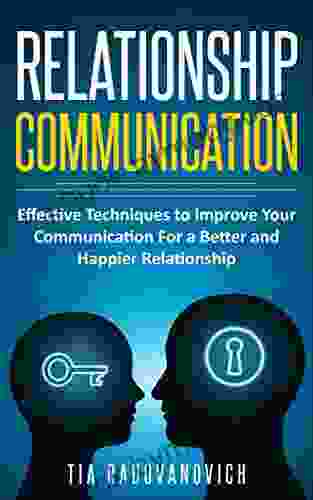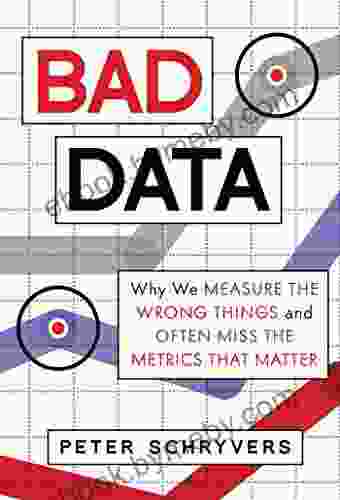Why We Measure the Wrong Things and Miss the Metrics that Matter

By John Doerr
4.6 out of 5
| Language | : | English |
| File size | : | 1215 KB |
| Text-to-Speech | : | Enabled |
| Screen Reader | : | Supported |
| Enhanced typesetting | : | Enabled |
| X-Ray | : | Enabled |
| Word Wise | : | Enabled |
| Print length | : | 338 pages |
We all want to be successful. But how do we know if we're on the right track? The answer is: by measuring our progress. But what if we're measuring the wrong things? What if we're so focused on the numbers that we miss the big picture?
In his book, Why We Measure the Wrong Things and Miss the Metrics that Matter, John Doerr argues that we're all guilty of this mistake. We're so focused on the easy-to-measure metrics that we forget about the harder-to-measure metrics that really matter.
For example, we might be measuring sales revenue, but we're not measuring customer satisfaction. Or we might be measuring website traffic, but we're not measuring the quality of the traffic. These are just two examples of the many ways we can measure the wrong things.
Doerr argues that this focus on the wrong metrics is leading us to make bad decisions. We're investing in things that don't matter, and we're ignoring the things that do.
So what are the right metrics? Doerr says that the right metrics are the ones that measure what we care about. They're the ones that help us track our progress toward our goals.
But finding the right metrics isn't always easy. It takes time and effort. But it's worth it. Because once we have the right metrics, we can finally start to measure our progress toward success.
The Four Key Metrics
Doerr identifies four key metrics that he believes are essential for measuring success:
1. Progress: This metric measures how far we've come toward our goals. It's important to track progress over time so that we can see if we're making headway. 2. Impact: This metric measures the difference we're making in the world. It's important to track impact so that we can see if our work is making a positive difference. 3. Health: This metric measures the sustainability of our organization. It's important to track health so that we can make sure that we're not burning ourselves out. 4. Happiness: This metric measures the well-being of our employees. It's important to track happiness so that we can make sure that our employees are engaged and motivated.
Doerr argues that these four metrics are essential for measuring success because they provide a comprehensive view of our progress. They show us how far we've come, what impact we're making, how sustainable we are, and how happy our employees are.
How to Use the Four Key Metrics
Once we have identified the right metrics, we need to know how to use them. Doerr recommends using the following four steps:
1. Set goals: The first step is to set goals for what we want to achieve. These goals should be specific, measurable, achievable, relevant, and time-bound. 2. Track progress: Once we have set goals, we need to track our progress toward achieving them. We can do this by using the four key metrics. 3. Make adjustments: As we track our progress, we may need to make adjustments to our goals or our strategies. This is a normal part of the process. 4. Celebrate success: When we achieve our goals, it's important to celebrate our success. This will help us stay motivated and keep us moving forward.
Measuring our progress is essential for success. But if we're measuring the wrong things, we'll never know if we're on the right track. The four key metrics that Doerr identifies in his book are a great starting point for measuring success. By using these metrics, we can track our progress, make adjustments, and celebrate our success.
4.6 out of 5
| Language | : | English |
| File size | : | 1215 KB |
| Text-to-Speech | : | Enabled |
| Screen Reader | : | Supported |
| Enhanced typesetting | : | Enabled |
| X-Ray | : | Enabled |
| Word Wise | : | Enabled |
| Print length | : | 338 pages |
Do you want to contribute by writing guest posts on this blog?
Please contact us and send us a resume of previous articles that you have written.
 Book
Book Novel
Novel Page
Page Chapter
Chapter Text
Text Story
Story Genre
Genre Reader
Reader Library
Library Paperback
Paperback E-book
E-book Magazine
Magazine Newspaper
Newspaper Paragraph
Paragraph Sentence
Sentence Bookmark
Bookmark Shelf
Shelf Glossary
Glossary Bibliography
Bibliography Foreword
Foreword Preface
Preface Synopsis
Synopsis Annotation
Annotation Footnote
Footnote Manuscript
Manuscript Scroll
Scroll Codex
Codex Tome
Tome Bestseller
Bestseller Classics
Classics Library card
Library card Narrative
Narrative Biography
Biography Autobiography
Autobiography Memoir
Memoir Reference
Reference Encyclopedia
Encyclopedia Mac Fortner
Mac Fortner Sandra Scofield
Sandra Scofield Naomi Moriyama
Naomi Moriyama Katherine Miller
Katherine Miller Karin Pfeiff Boschek
Karin Pfeiff Boschek Kathy Freston
Kathy Freston Robert Allans
Robert Allans Tali Carmi
Tali Carmi Karyl Rickard
Karyl Rickard Katherine Pym
Katherine Pym Ronni Lundy
Ronni Lundy Val Holley
Val Holley Karen Winter
Karen Winter Katie Zhao
Katie Zhao Katherine Graham
Katherine Graham Kate Willis
Kate Willis Sabra Waldfogel
Sabra Waldfogel Kevin Harris
Kevin Harris Justin Eisinger
Justin Eisinger Tina Turner
Tina Turner
Light bulbAdvertise smarter! Our strategic ad space ensures maximum exposure. Reserve your spot today!

 Miguel de CervantesCelebrate Thanksgiving: Fun Learning Activity Picture and Guessing Game for...
Miguel de CervantesCelebrate Thanksgiving: Fun Learning Activity Picture and Guessing Game for...
 Colton CarterUnveiling the Enthralling Starburst Effect: A Literary Masterpiece by Kelly...
Colton CarterUnveiling the Enthralling Starburst Effect: A Literary Masterpiece by Kelly... Marc FosterFollow ·17.3k
Marc FosterFollow ·17.3k Reginald CoxFollow ·19.6k
Reginald CoxFollow ·19.6k Andres CarterFollow ·10.5k
Andres CarterFollow ·10.5k Billy PetersonFollow ·19.9k
Billy PetersonFollow ·19.9k Avery SimmonsFollow ·10.4k
Avery SimmonsFollow ·10.4k Victor TurnerFollow ·2.9k
Victor TurnerFollow ·2.9k Ismael HayesFollow ·16.4k
Ismael HayesFollow ·16.4k Yasunari KawabataFollow ·18k
Yasunari KawabataFollow ·18k

 George Orwell
George OrwellPandemic with Dogs: Two Essays
By Susannah Charleson In the midst of...

 Leo Mitchell
Leo MitchellAdam Smith's The Wealth of Nations: A Classic Treatise on...
Adam Smith's The...

 Cade Simmons
Cade SimmonsUnlock Your Communication Potential: Effective Techniques...
Communication is a fundamental...

 Floyd Richardson
Floyd RichardsonFire and Ashes: Success and Failure in Politics
Fire and Ashes: Success and...

 Oliver Foster
Oliver FosterUnlock the Enchanting Mystery of Ken Follett's "The Key...
Embark on a captivating literary journey into...
4.6 out of 5
| Language | : | English |
| File size | : | 1215 KB |
| Text-to-Speech | : | Enabled |
| Screen Reader | : | Supported |
| Enhanced typesetting | : | Enabled |
| X-Ray | : | Enabled |
| Word Wise | : | Enabled |
| Print length | : | 338 pages |










